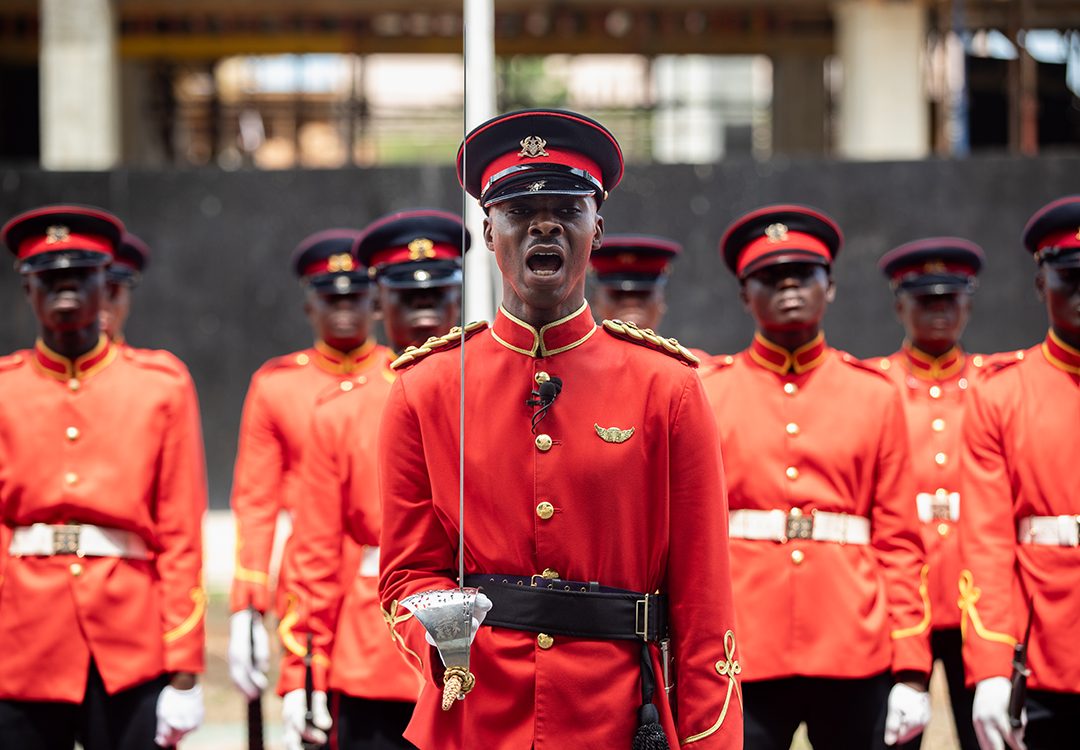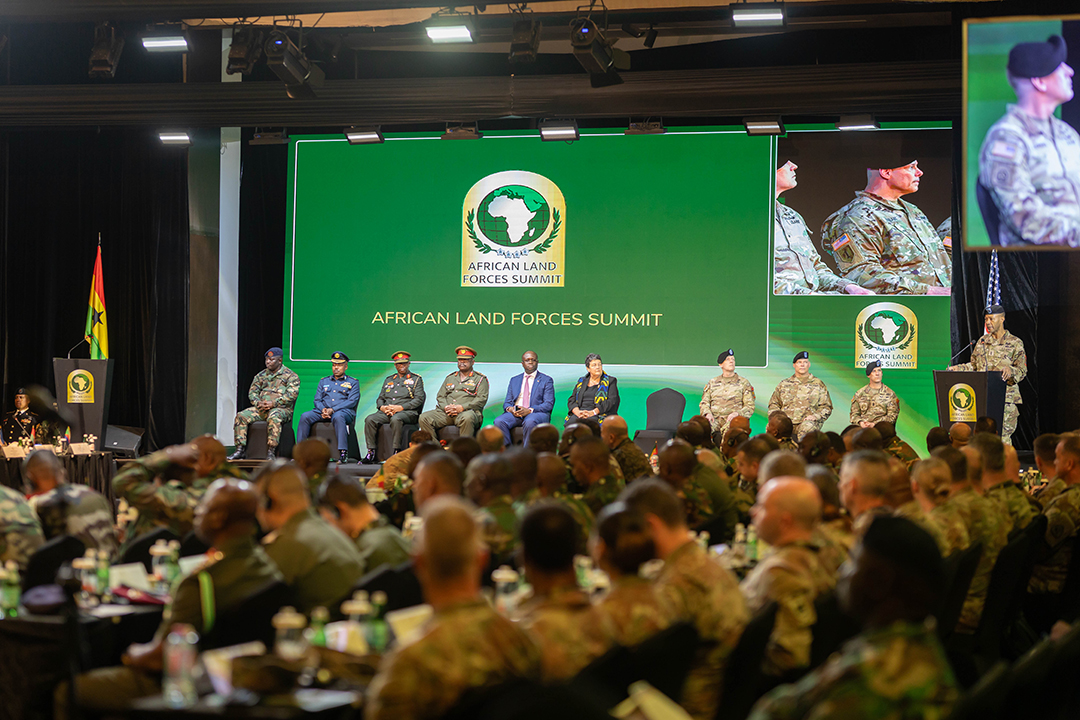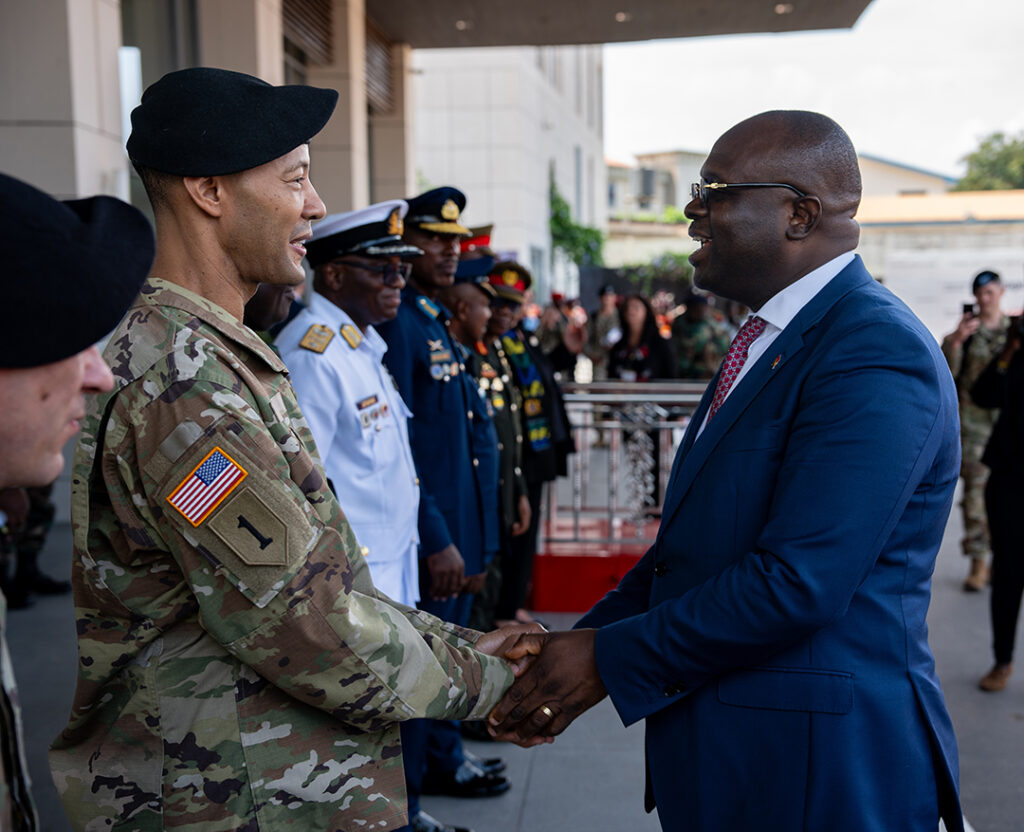It was not easy for Nigerian Maj. Gen. Godwin Mutkut to take a week away from his post as force commander of the Multinational Joint Task Force (MNJTF), which is fighting extremism and banditry in the Lake Chad Basin.
He said the challenges are immense. Terror groups are burrowed into dense island “fortresses” that dot the lake. The task force is short on equipment such as fast boats and aerial assets. Its five-country alliance is fraying with Niger possibly departing.
But Mutkut believes that attending the African Land Forces Summit in Accra, Ghana, was not a distraction from his work. In fact, he said, it is essential to it.
“There couldn’t be a better forum than this that would afford me the opportunity to meet the various service chiefs of all the troop-contributing countries and talk to them one on one,” Mutkut told ADF.
He recounted conversations with the chiefs of army staff from Benin and Chad, who inquired in great detail about the progress in the terror fight and assured him of their support. He is leaving the summit feeling that these conversations helped strengthen the more than decade-old counterterror alliance.

“MNJTF is the epitome of what we are trying to bridge here,” Mutkut said. “The jointness and togetherness we are talking about, MNJTF stands for that.”
Military commanders from more than 40 African countries and other parts of the world gathered in Accra for the 13th African Land Forces Summit from April 7 to 10.
The event, co-hosted by the Ghana Armed Forces and the U.S. Southern European Task Force, Africa (SETAF-AF), was themed “Optimizing land forces for the emerging security environment.”
During plenary sessions, speakers covered issues ranging from border security to professional military education and cyber threats. The Ghana Armed Forces showcased the country’s special operations forces with a vessel boarding, beach landing and simulated hostage rescue.
In opening remarks, SETAF-AF Commander Maj. Gen. Andrew Gainey urged participants to take advantage of “unmatched opportunities” to make strides toward “operational independence.” Above all, he wanted African land force commanders to build bonds of trust with one another that they can leverage to face shared threats.
“The threats we face today have no boundaries, they have no borders, and they require more than just optimized land forces,” Gainey said. “That’s the value of the summit that brought us here today. Together, we strengthen the bond between African land forces. Together, we reinforce the trust and collaboration needed to address some of the world’s most pressing security challenges.”
Brig. Gen. Simon Ndour, Senegal’s chief of army staff, took these words to heart. Although only four months into his current job, he found familiar faces in the summit banquet hall from his decades of service and his roles serving in six peacekeeping missions. He called the reunions a “special satisfaction.”
“We met in the academies; we met on missions through the years. So, to see them again is a real pleasure,” he said of his fellow commanders.

Ndour was particularly interested in sharing best practices about how to secure border regions. Across the continent, porous borders and neglected border communities have become hotbeds of trafficking and extremism. In North and West Africa, 23% of violent events occur within 20 kilometers of a border.
Since 2003, Mali, Mauritania and Senegal have had a border management program that allows for joint patrols and other collaboration. Ndour shared his experience with colleagues and heard new ideas in return, including presentations on the use of “smart border technology,” outreach to border communities and modernizing border demarcation.
“You get the background from other countries and hear how they are handling their border because some countries are facing a lot more insecurity than Senegal,” Ndour told ADF. “So, it’s good to know how they are managing their army to face the challenges.”
Dr. Edward Kofi Omane Boamah, Ghana’s minister of defense, said he hoped to see “workable and cost-effective solutions” emerge from the discussions by summit participants. He urged them to make the most of their time.
“Opportunities such as the African Land Forces Summit 2025 offer a unique entry point and platform to source solutions from some of the best brains in the defense and security sector globally,” Boamah said. “I trust that your deliberations will yield pioneering ideas, groundbreaking ideas, that will yield long-term solutions to our common challenges.”

